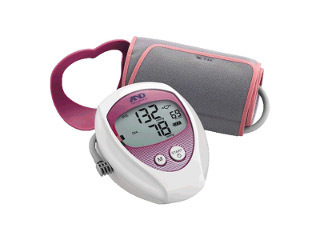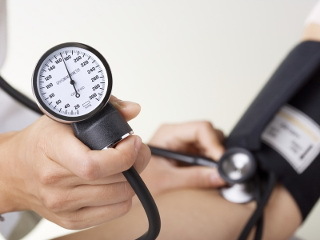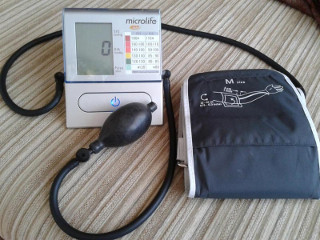Which tonometer is better: how to choose the most accurate and reliable, an overview of pressure measuring devices

Content:
- How to choose a tonometer
- The most accurate and reliable
Today on the medical equipment market you can find a variety of models tonometers - devices that measure blood pressure (BP). Such a device is simply necessary for people who are diagnosed with arterial hypertension. Among the wide variety of instrument models, many have questions about which tonometer is better, more reliable and more accurate. Why buy a device for measuring pressure, and what you should pay attention to when choosing a tonometer, let us dwell in more detail.
Why buy a blood pressure monitor
The blood pressure rate is 80 mm. rt. Art. diastolic and 120 mm. rt. Art. systolic characterizes the normal functioning of the circulatory system. These indicators can deviate up and down by no more than 10 mm. rt. Art. If the deviation from the norm exceeds the indicated values, then this indicates that the cardiovascular system suffers from pathology.
Constantly elevated blood pressure - hypertension, which is dangerous for stroke and heart attack. For the correct therapy of a dangerous ailment, the patient needs daily pressure monitoring, which is carried out using a tonometer.
The tonometer helps hypertensive patients in the following:
- do not waste time visiting the clinic, but measure blood pressure in a calm home environment;
- in case of deterioration in health, timely determine a sharp jump in pressure and take medicine;
- monitor the result of therapy (taking certain pills and other methods of treatment);
- monitor the change in pressure after switching to a healthy lifestyle (quitting smoking and alcohol, playing sports, etc.).
It is advisable to have a tonometer in a home medicine cabinet for people who suffer from diabetes mellitus, diseases of the heart and blood vessels, who have hormonal disorders experiencing constant psycho-emotional stress and stress, as well as those who often smoke and use alcoholic drinks. Athletes need a tonometer to monitor physical activity.
For some indications, frequent blood pressure measurements may be recommended for pregnant women. The device is necessary for the elderly, due to the general deterioration of health.
What you need to consider when buying a tonometer home
Tonometers of different models have one important function in common - to measure blood pressure correctly and accurately. However, they differ in their additional functionality, usability, price and other criteria. Among the wide variety, it is not so easy to understand which blood pressure monitor is better. Therefore, it is necessary to highlight the main issues and, based on them, determine the model.
- How often do you need to operate? If it is necessary to monitor the pressure on a daily basis, then it is better to opt for an automatic model. Such blood pressure monitors perform all stages of measurements independently and quickly.
- How old is the patient? The most popular models are wrist tonometers or devices with a shoulder cuff. The first device is ideal for young people such as athletes and middle-aged people. After fifty years, a tonometer with a shoulder cuff should be purchased. This is due to the fact that blood vessels lose elasticity with age, especially in the wrist, which makes it difficult to accurately measure blood pressure.
- Are there any cardiovascular diseases? Some diseases are accompanied by abnormal heart rate. Modern automatic blood pressure monitors, in addition to determining blood pressure, also calculate the heart rate. Therefore, the question: "Which tonometer is better for a person with atrial fibrillation?" should be narrowed down to the choice of a device with automatic determination of blood pressure indicators.
- What is the price of a tonometer? The choice of a tonometer for the home is often determined by the price. The price range of pressure measuring devices ranges from 500 to 6000 rubles. This difference is due to the presence of additional functions in the devices. The cheapest are mechanical blood pressure monitors, the most expensive are automatic ones, which have an impressive functionality: memory, clock, voice notification of results, movement indicators, tone reproduction hearts, etc.
- Can I measure the pressure myself? This is one of the most important questions, since if a person needs to take measurements on his own at least occasionally, then it is impossible to buy a mechanical device. A feature of this tonometer is that it is difficult to use, and self-measurement of blood pressure can significantly distort the results. In this case, automatic or semi-automatic models are suitable.
Tonometer cuff and its size
It is equally important to choose the right cuff. It consists of fabric, mainly nylon, a pneumatic chamber located inside and fixators (Velcro). In order for blood pressure measurements to be as accurate as possible, you need to select the appropriate cuff size.
Ideally, the length of the pneumatic chamber should match the circumference of the upper arm, so that the compression of the arm is uniform. Therefore, before buying, you should measure the shoulder coverage approximately in the middle, between the cubital fossa and the collarbone.
The cuff dimensions are indicated by a numerical range, which should include the calculated arm circumference. For example, if the shoulder circumference is 28 cm, then a cuff with a size of
There are child and adult cuffs. Home appliances are most often equipped with medium-sized cuffs. If the pharmacy does not have a device with a suitable cuff, then the device can be ordered on the Internet at specialized sites. In the instructions for the tonometer, manufacturers usually indicate a size table, according to which you can easily choose the optimal cuff size.
How to choose a tonometer: automatic, semi-automatic or mechanical - which is better
 Today there are mechanical, semi-automatic and automatic blood pressure monitors on the market. Which is better, how to choose a pressure meter for home use - questions that worry modern people.
Today there are mechanical, semi-automatic and automatic blood pressure monitors on the market. Which is better, how to choose a pressure meter for home use - questions that worry modern people.
The first pressure measuring devices were invented in Austria in 1881. The pressure was measured with a mercury manometer. A little later, the device was supplemented with a cuff, and the Russian surgeon N.S. Korotkov described a measurement method with listening to systolic and diastolic tones.
Mechanical tonometers were replaced by semi-automatic devices that automatically determined blood pressure indicators. Fully automatic devices were first produced in Japan and South Korea.
It may seem that the question of how to choose a tonometer from the above is obvious - the latest models are better. However, they each have their own advantages and disadvantages.
For example, mechanical blood pressure monitors are considered the most accurate and are still used in hospitals and clinics today. An important factor is the price of the device. Therefore, you should carefully evaluate the need for the functions of expensive models and the advantages of cheaper ones.
Automatic tonometer
Devices that automatically perform all stages of measurements appeared at the end of the last century. Their operation is simple, and additional functionality makes this procedure even easier and more informative. A person just needs to put on the cuff correctly and press the appropriate buttons.
With the help of a built-in electric motor, the air is independently pumped into the cuff to the required level. Electronics "hears" sounds (tones), counts the pulse and displays the indicators on the monitor. The automatic blood pressure monitor can measure pressure on the shoulder, wrist or finger.
Which one is better and how to choose it depends on various factors: age, frequency of use, the ability to take the device with you, etc. The least accurate of all is a finger-based blood pressure monitor.
Semi-automatic tonometer
Automatic or semi-automatic tonometer, which is better, how to choose - the most frequently discussed questions on the forums. And this is no accident. The difference from mechanical models is noticeable, but these types of devices differ slightly from each other.
The semiautomatic device, as well as the automatic device, determines the blood pressure and pulse automatically, and the cuff must be inflated manually using a rubber bulb.
Additional functions of semi-automatic blood pressure monitors have a more modest list, but the device contains all the necessary functionality.
How to choose a tonometer from existing automatic and semi-automatic models is often determined by the price. The latter are much cheaper, since they do not have electric motors. In addition, the absence of an automatic air blower saves the cost of replacing batteries and accumulators because they last longer.
According to the majority of forum participants, the semiautomatic device is the best tonometer for home use.
Mechanical tonometer (sphygmomanometer)
The device consists of a cuff worn on the shoulder, a pressure gauge and an air blower with an adjustable valve. Blood pressure indicators are established by listening to characteristic sounds through the phonendoscope and the ratio of these sounds to the indicators on the manometer.
If in automatic models, blood pressure is determined by electronics, then when using these devices, a person is required who can do it professionally. Therefore, mechanical blood pressure monitors are recommended to be used only by specially trained people, that is, medical workers.
Despite the complexity of operation, sphygmomanometers can still be bought for the home. Before choosing a tonometer that takes into account the human factor, you need to decide who will take the measurements. If there is a person in the family who can measure the patient's blood pressure, then good hearing, vision and attentiveness are sufficient to learn how to use a mechanical device.
What are the most accurate and reliable blood pressure monitors: product functionality and manufacturer rating
 Automatic, mechanical, wrist, shoulder - there are many pressure measuring devices, but still, which one is better, according to buyers and doctors?
Automatic, mechanical, wrist, shoulder - there are many pressure measuring devices, but still, which one is better, according to buyers and doctors?
To take into account all the subtleties and make the right choice, you should not rush, because such a device will last for many years. You need to study all the advantages of different types of blood pressure monitors, read reviews about each model you are interested in, and then buy.
If you need a semi-automatic or automatic pressure measuring device, which one is better to determine by the functionality of the devices.
You can get acquainted with the assortment of blood pressure monitors from different manufacturers on the official websites or in specialized online stores.
The most common additional features of automatic models are:
- registration in the memory of the last measurements (some models are designed for two people);
- control of the correct fixation of the cuff;
- control of movements during measurements;
- voice notification;
- intelligent air injection into the cuff (calculated individually, according to the average);
- revealing arrhythmias;
- measurement quality control system;
- clock.
The attending physician will help you decide on the choice of tonometers. For example, if a person suffers from cardiac arrhythmia, then he needs a model that monitors heart rhythms, and if a tonometer is purchased for a person with fragile, weak vessels, it is better to choose a mechanical model that differs in maximum accuracy.
But which blood pressure monitors are the most accurate and reliable will be prompted by the rating, which is formed due to the volume of sales and customer reviews.
Rating of blood pressure monitors
The most common pressure measuring devices are manufactured by Omron, Microlife, AND. These companies produce different types of blood pressure monitors: automatic machines, semiautomatic devices, mechanical models, wrist devices.
-
Omron blood pressure monitors. Japanese products are famous for their high quality and unique technologies. The answer to such a question as: "Electronic tonometer - which is better?", Should be sought in the assortment of this company. Tonometers manufactured by Omron are successfully sold all over the world, including Russia. Among competing products, the cost of Omron pressure meters is higher. Exceeding the price of
20-30 percent is associated with a good marketing company and a high reputation of the firm. - Microlife blood pressure monitors. Products manufactured under this brand are developed in Switzerland. The quality of the goods is not inferior to the previous manufacturer, but the price is more loyal. The most accurate and reliable blood pressure monitors can undoubtedly be purchased from Microlife, as home blood pressure monitors are the main focus of this company.
- AND products. Tonometers of this brand were developed in the USA. The company was the first to receive a patent for an oscillometric method for measuring blood pressure (automatic). The AND medical electronics rankings ranked high worldwide.
Partial use of site materials (no more than 30% of the content of the article) is allowed only with a hyperlink on www.med88.ru, full use of the article (more than 30% of the article content) is possible only with written permission edition.


